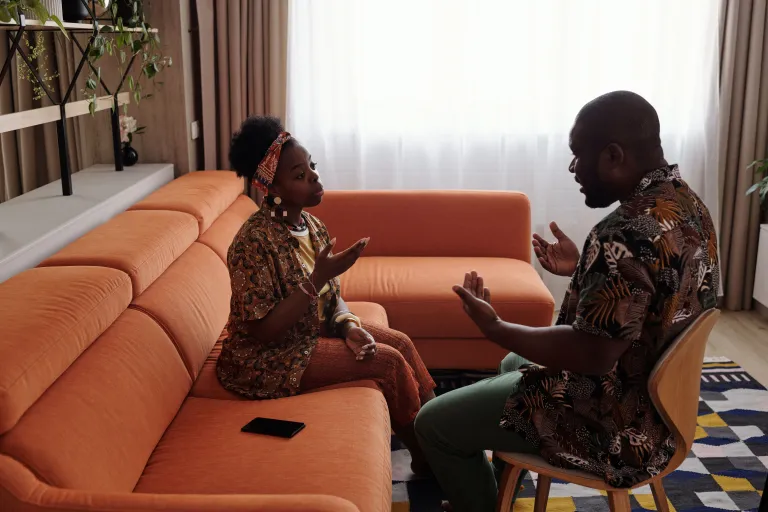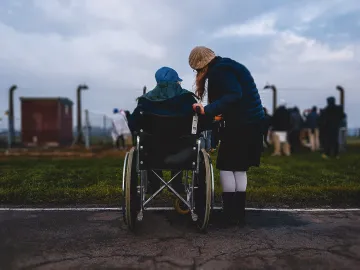
Emotional intelligence has a real practical purpose. It can mean we're better able to comprehend where our emotions - and the emotions of others - might be coming from. And by developing our emotional intelligence, we can begin to interrupt any cycles of emotion that might not be useful - or might be causing problems in our relationships with others.
What is emotional intelligence?
In short: being emotionally intelligent means having the ability to look at your emotions objectively - or, at least, more objectively. It's related to what some psychologists call metacognition - the act of thinking about your own thoughts. Someone who is emotionally intelligent doesn't just unthinkingly experience and act upon their emotions - they have the ability to notice these emotions and question the reasoning behind them.
When we aren’t using emotional intelligence, it can be easy for us to be driven primarily by our emotions. We might find ourselves acting erratically or impulsively - getting really angry in reaction to something a friend says, or inexplicably depressed when faced with a conflict with a partner. We may find it difficult to control what can feel like automatic reactions. This can be exhausting, and can mean we end up acting in ways that are destructive to ourselves and to our relationships with others.
Likewise, if we're frequently acting without thinking, it can be easy for these reactions to become patterns. If we act in a certain way enough times - in other words, if it becomes a habit - we can get into loops of behaviour. We may find that our automatic reaction becomes our primary reaction - that we're always angry when challenged, or always upset after an argument - because we’ve gotten so used to acting in this way. At this point, it can be very difficult to get out of the habit, because it’s become so ingrained through repetition.
How can we develop our emotional intelligence?
It can be tempting to think of emotional intelligence as a fixed thing. We might imagine that it's not possible to become 'more intelligent'.
But this isn't necessarily the case. Perhaps a better term for what we're talking about would be 'emotional skill' or 'emotional ability'. And just as you can practice a skill until you get better and better, so you can develop your emotional intelligence.
The first part of this process is to try to interrupt any automatic reactions that you might have developed over the years. This can be a tricky thing: part of something being automatic is that you don't necessarily realise you're doing it.
A useful starting point can be to think about whether there's anything you're doing that's getting in the way of your ability to feel happy and calm - or in the way of any of the relationships in your life. You don’t necessarily need to start with anything really big or difficult-feeling. You could start by working on something small as a way of getting into practice.
Then it's a case of trying to be proactive in intercepting and pausing these behaviours. This doesn't mean aggressively trying to change the way you act, it just means trying to develop the ability to notice when you're doing something, or are about to do something, and think - in a nonjudgemental way - about what might be going on.
The term 'nonjudgemental' here is key - the temptation can be to be pretty hard on ourselves about this kind of stuff - to think 'why am I doing this? What's wrong with me?' But thinking in these terms is as likely to make you want to give up as change. It can be much more productive to try to be a 'critical friend' to ourselves - to be able to see what might be going wrong, but think in constructive terms about this, instead of being punitive. So: instead of thinking ‘I need to fix this’, you might think: ‘I can see why I might be doing this, but I don’t think it’s the most useful thing for me to do.’
There's every chance this whole process is going to feel a little awkward at first. Apart from resisting the temptation to belittle ourselves for our shortcomings, there's also the fact that, because you're interrupting a process that has been - most likely for a while - automatic, you're probably going to feel a little uncomfortable. It can feel very strange to stop ourselves doing things that feel natural to us, even if those things are causing problems in our relationships with others and with ourselves. But by trying to do this regularly - and, again, by trying to do it in a constructive manner - you can begin to make it a habit, just as the negative behaviour may have become a habit in the first place.
How we can develop empathy
One thing you may notice happening as you develop your own emotional intelligence is that you become better at understanding and analysing the emotions of others.
This can be useful for two reasons. Firstly, it can mean you have closer and more intimate relationships with the people around you. It may mean you develop a language and ability to talk about your and others' emotions - to ask questions and give responses that allow for a greater depth of understanding between yourself and your friends or partner.
And secondly, it can mean you're better able to negotiate the more difficult aspects of your relationships with other people. This can be particularly helpful in romantic relationships. If you're thinking in emotionally intelligent terms, it can mean you're more likely to be able to react to behaviour on the part of your partner that you find annoying, or upsetting, or confusing and think - what else could be going on here?
The process of stopping and analysing can mean that not only are you able to get out of negative emotional loops in your own life, but also able to interrupt negative patterns of communication between you and your partner. You may find that developing this skill means you don't have to react to a negative comment or sarcastic aside with one of your own - but with calmness, or even compassion.
How we can help
If you’re looking for support with your relationships, we can help. We offer a range of ways to speak with a trained relationship expert including ongoing counselling, 30 minute web and phone chats, and one session therapy.
Find out which service is right for you
How you can help
Have you found this advice helpful? Make a donation to help us reach more people and continue supporting the nation’s relationships:
Can't afford to donate? We understand. Instead, we ask that you leave us a 5 star review on Trustpilot.


